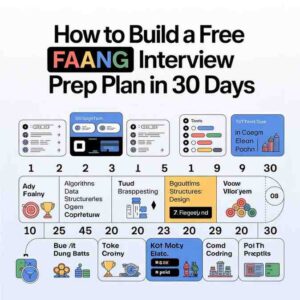Hey there, fellow tech enthusiast. Picture this: You’re at a bustling conference, mic in hand, captivating a room full of developers with a story about how your company’s API just solved their biggest headache. The crowd’s nodding, questions are flying, and suddenly, you’re not just a coder, you’re a bridge between brilliant ideas and real-world impact. That’s the magic of Developer Relations, or DevRel for short. If you’ve ever felt that pull toward something bigger than debugging late into the night, this devrel career roadmap is your ticket.
In today’s fast-evolving tech landscape, DevRel isn’t just a buzzword, it’s a powerhouse role driving adoption, fostering loyalty, and turning skeptics into superfans. According to the 2024 State of Developer Relations report, 66.1% of DevRel programs aim to boost awareness and adoption, with teams reporting up to 40% higher product uptake thanks to dedicated advocates. But here’s the kicker: With layoffs hitting 18.1% of pros last year and budgets tightening, breaking in requires more than passion; it demands a smart, step-by-step plan. That’s where this devrel career roadmap comes in.
Over the next 2,000 words (give or take), we’ll unpack seven transformative steps, packed with actionable tips, hard-hitting stats, and stories from the trenches. Whether you’re a fresh grad eyeing developer relations skills or a mid-level engineer itching to pivot, let’s map out your path to becoming a developer advocate who doesn’t just talk the talk, but codes it too.
Table of Contents
Why DevRel? The Heartbeat of Modern Tech Success
Let’s get real: Tech moves at warp speed, and companies are scrambling to keep developers happy. DevRel pros are the unsung heroes who make that happen. They educate, advocate, and evangelize, turning complex tech into accessible wins. But why jump in now? Simple, demand is surging. A 2025 developer marketing stat shows that companies investing in DevRel see 35% faster adoption rates, outpacing traditional marketing by a mile.
Think about it. Developers aren’t swayed by flashy ads; 87% trust peer recommendations before trying a tool. That’s where you come in as a DevRel wizard, building trust through genuine connections. And the payoff? Median salaries hover around $150,000 USD, with total comp pushing $193,000 for many. Not bad for a gig that feels more like throwing epic parties for coders than a 9-to-5 grind.
Of course, it’s not all sunshine. Burnout looms large for 37.6% of pros, thanks to constant content demands and event hustles. But armed with this devrel career roadmap, you’ll sidestep those pitfalls and focus on what lights you up: Impact. Ready to dive deeper into the developer relations skills that make it all click?
Master These Core Developer Relations Skills Before You Leap
No devrel career roadmap is complete without nailing the fundamentals. Developer relations skills split into two camps: the art of connection and the science of code. Skip either, and you’re just shouting into the void. Let’s break it down.
Communication: Your Superpower in a Noisy World:
Ever watched a TED Talk and thought, “I could do that”? Well, in DevRel, you have to. Public speaking tops the list, with 40.3% of pros spending their days on stage or screen. Start small: Join Toastmasters or record yourself explaining a simple API call. Pro tip? Use the “rule of three”, structure talks around three key points for stickiness.
Writing’s next. Blogs aren’t optional; they drive 3x more traffic than paid ads in dev circles. Hone your voice on Medium: Pick a pain point like “Why Your SDK Sucks (And How to Fix It),” then weave in code snippets. Social media? LinkedIn reigns supreme, 39.8% of outreach happens there. Post daily tips, but keep it real, no corporate fluff. Developers smell that a mile away.
Actionable tip: Practice active listening in Q&A sessions. Anticipate tough questions like “How does this scale?” and prep concise answers. One DevRel vet I chatted with swore by mind mapping for brainstorming talks, it turned her from nervous newbie to conference staple in six months.
Technical Prowess: Code Like You Mean It:
Don’t worry, you don’t need to be a 10x engineer, but basic chops are non-negotiable. Python, JavaScript, and Node.js top the list for versatility. If you’re rusty, fire up freeCodeCamp’s backend challenges. Why? Because 72% of devs learn best through hands-on docs, not sales spiels.
Git is your best friend, master branches, PRs, and labeling for clean collaboration. Tools like VS Code? Non-negotiable for quick SDK tweaks. And APIs? Understand REST, GraphQL, and docs writing inside out. Remember, 63% of devs stick with tools offering interactive tutorials.
Real-world example: A junior dev I know pivoted to DevRel by contributing to open-source repos. One pull request led to a mentorship gig at a SaaS firm, boom, entry-level advocate role secured. These developer relations skills aren’t innate; they’re built, one commit at a time.
Building DevRel Communities: From Zero to Hero Hub
Ah, communities, the beating heart of any devrel career roadmap. Forget megaphones; real magic happens in shared spaces where devs swap war stories and solutions. But building devrel communities isn’t plug-and-play. It takes strategy, empathy, and a dash of grit.
Start by knowing your crowd. Who are they, indie hackers or enterprise architects? Survey potential members via Twitter polls: “What’s your biggest API gripe?” Platforms matter too: Discord for real-time chats (58% say it builds trust), Slack for structured Q&A.
Guidelines are key. Draft a code of conduct early, promote inclusivity, ban toxicity. Then, foster participation: Host AMAs with influencers or “bug bashes” for collaborative debugging. Recognition? Shout out top contributors in newsletters; it keeps the vibe alive.
Case study time: Take Stripe’s dev community. They started with a simple forum in 2011, added hackathons, and now boast millions in active users. Result? 2.7x higher retention than rivals. Their secret? Consistent events and feedback loops, mirroring 51% of programs that prioritize nurturing over one-off blasts.
Actionable tips for you:
- Outreach hack: Partner with Stack Overflow, 78% of devs discover tools there. Cross-post answers with subtle plugs.
- Moderation must: Use bots for spam, but humans for nuance. Resolve conflicts privately, empathy wins hearts.
- Growth metric: Aim for 20% monthly engagement. Track with Google Analytics; tweak based on drop-offs.
DevRel Content Strategies: Craft Stories That Stick
Content isn’t king in DevRel, it’s the entire kingdom. With 50.3% of pros knee-deep in educational materials, mastering devrel content strategies is your edge. But drowning in blogs? Nah. Focus on what devs crave: Value-packed, jargon-free gems.
Blogs first. SEO basics: Target long-tails like “fixing async API errors in Node.” Write process? Outline, draft, edit ruthlessly, aim for 1,500 words with code embeds. Guest post on Dev.to for reach; 52% higher organic traffic from dev-focused pieces.
Videos? Goldmine. 61% prefer YouTube tutorials over walls of text. Script tight: Hook in 10 seconds, demo in minutes. Tools like Streamyard for lives; add animations for flair. Live streams on Twitch? Engage with chat, 70% join for live coding.
Social strategy: Consistent voice across LinkedIn and X. Post threads on “DevRel Fails I Learned From,” track engagement with built-in analytics. Data-driven? A/B test thumbnails; iterate weekly.
Example in action: Twilio’s dev blog series on SMS integrations exploded their API calls by 25% in Q1 2024. They nailed cross-promotion, tweets linking to videos, videos teasing blogs. Your devrel content strategies? Start a “weekly wins” newsletter; watch subscribers (and influence) climb.
Becoming a Developer Advocate: Your 7-Step DevRel Career Roadmap
Alright, boots-on-the-ground time. This devrel career roadmap boils down to seven steps, each with tips to propel you forward. Follow it, and becoming a developer advocate isn’t a dream; it’s your next LinkedIn update.
Step 1: Audit Your Toolkit
Assess gaps in developer relations skills. Take the State of DevRel quiz online—what’s your comms score? Fill holes with Coursera’s public speaking course or GitHub’s API labs.
Step 2: Dip into Open Source
Contribute weekly. Fix a doc typo? That’s a win. 65% of devs eye open-source activity when vetting vendors. Bonus: Network in issues tabs.
Step 3: Launch Personal Content
Pick one platform. Blog your first “DevRel Day in the Life.” Consistency beats perfection—post bi-weekly.
Step 4: Join or Start a Community
Volunteer at meetups. Or bootstrap a Discord for your niche (e.g., Rust newbies). Remember: Listen first, lead second.
Step 5: Speak Up—Literally
Submit to local confs. Prep with PechaKucha (20 slides, 20 seconds each). Nerves? Breathe—audience wants you to succeed.
Step 6: Seek Feedback Loops
Shadow a pro via Twitter DMs. Track your impact: Did that tweet spark a convo? Adjust ruthlessly.
Step 7: Land the Gig
Tailor resumes to “advocacy + education.” Highlight metrics: “Grew community 30% via events.” Entry roles? Aim for startups, 49.5% of teams are small.
Real talk: My buddy Jake followed this devrel career roadmap from QA tester to Stripe advocate in 18 months. Key? Step 4’s community grind led to his big break.
Measuring DevRel Wins: Metrics That Matter
Success without numbers? That’s folklore, not strategy. In DevRel, 44.3% track active users, but revenue influence is rising at 17.5%. Tools: Google Analytics for traffic, NPS for satisfaction.
Challenges? 60.7% struggle proving impact. Fix it: Tie content views to sign-ups. Quarterly audits? 16.2% do it, join them.
Tip: Visualize with dashboards. Share wins cross-team; 85% collaborate monthly with product folks.
FAQs
How Do I Start a DevRel Career with No Experience?
Bootstrap with open-source and content. Volunteer for events, many orgs need fresh voices. Focus on transferable skills like teaching; 50.2% learn on the job anyway.
What Are the Top Developer Relations Skills for 2025?
Communication (speaking, writing) and tech basics (APIs, Git). Add AI tools, 42% use them for content. Stay nimble; trends like edge computing are hot.
How to Build DevRel Communities from Scratch in a Remote World?
Pick Discord or LinkedIn groups. Host virtual coffee chats weekly. Key: 26.4% define activity by event attendance—make yours unmissable.
Best DevRel Content Strategies for Busy Schedules?
Batch-create: Sundays for scripting videos, Wednesdays for posts. Repurpose, blog to thread to reel. Aim for 80% value, 20% promo.
Challenges in Becoming a Developer Advocate and How to Overcome Them?
Burnout? Set boundaries, 37.6% face it. No path? Advocate internally; 61% lack defined tracks. Network relentlessly.
Wrapping It Up: Your DevRel Adventure Awaits
There you have it, the ultimate devrel career roadmap, from skill-building to community conquests. You’ve got the steps, stats, and stories to fuel your fire. DevRel isn’t a job; it’s a movement where curious minds like yours shape tech’s future. So, what’s your first move? Drop a comment, hit that open-source repo, or pitch your dream talk. The dev world needs you, go ignite some passion.
























